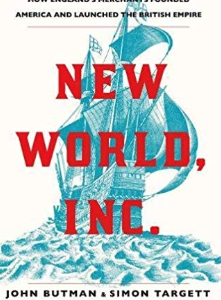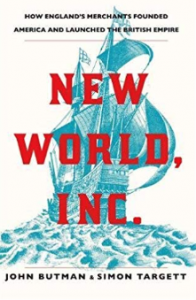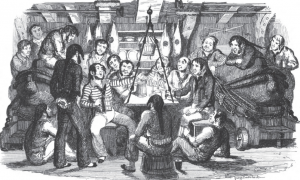
England’s merchant who founded America and made the Empire




In the mid-sixteenth century, England was indeed a relatively insignificant small kingdom on the periphery of Europe. Group merchants formed the world’s first joint-stock company and set out seek new markets and trading partners. Archival research and bold interpretation of the historical record, New World, Inc. paints a portrait of life in London, on the Atlantic and across the New World and looks into the world of the profit-hungry business people who transformed England into a world power.
The founding of the Plymouth Colony, in Massachusetts in 1620 has long served an ideological and inspirational purpose, the beacon of religious and individual freedom. The voyage of the Mayflower was actually the end of the beginning of the inadvertent founding of the American colonies. The pilgrim venture was the outcome of English attempts over seven decades to reach the East and Cathay ( China), as their goal was to find new business opportunities to trade the country’s stable export, wool in the face of the collapse of the European markets in the mid-16th century. The American Commonwealth existed in a big way because of the centuries-old lure of China. English exploration and eventual colonisation which was once called the Age of Discovery, which no longer the ill-fated and unsuccessful Roanoke and Jamestown trading of the late 16th and early 17th centuries be considered historical aberrations before the desire for freedom of worship firmly planted the Pilgrims on the “Virgin” soil of North America.
John Butman and Simon Targett document the internal and external threats facing England that Henry VIII bequeathed to his descendants. Over-reliance on wool exports was a vulnerability that threatened the realm’s fiscal stability. The Spanish and Dutch threat propelled the English to expand their trade networks to Muscovy and as far as the Spice Islands in Indonesia. Commerce was the prime reason that drove American colonisation by the English. America was not envisioned as a haven for persecuted sects, but a potential source of valuable resources and a station on the road to Cathay.
All the expenses of outfitting expeditions and planting colonies were underwritten by companies of “merchant adventurers”, whose sole goal was profit. Merchants sought the help of scientists, publicists, explorers and courtiers all coming together for personal interest.
New World, Inc. How England’s Merchants Founded and Launched the British Empire by John Butman and Simon Targett, Atlantic Books £25, 406 pages.
